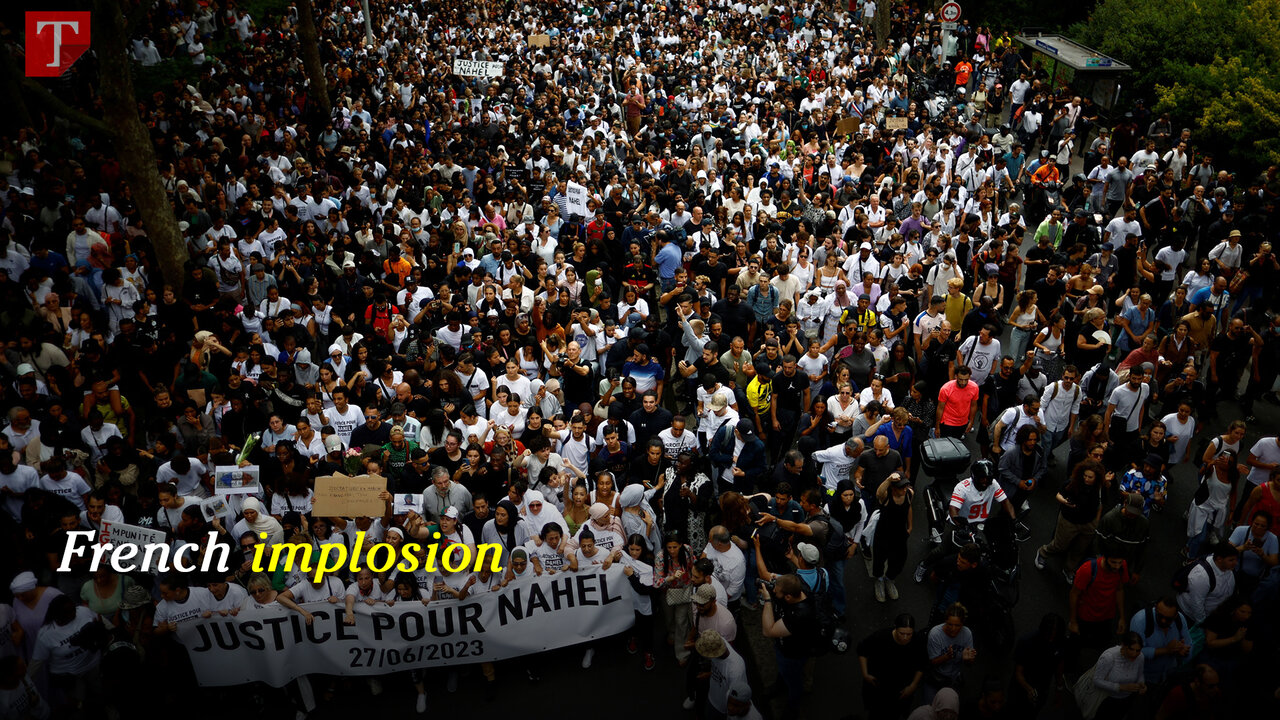French rebellion spills into Belgium, Switzerland

TEHRAN - Protests against racial discrimination against minorities in France have spread beyond this European country’s borders
What began as an uprising in a rural-class French neighborhood has morphed into a wider outburst of hate and anger toward discriminatory state and police violence.
A week of violent unrest in major French cities has been described by witnesses and reporters on the ground as a civil war.
Thousands of people joining nationwide demonstrations against the brutal and racial profiling of France's police and other security forces have been arrested.
Days of unrest and riot in France have broadened to neighboring Switzerland, after spilling over into Belgium earlier this week.
The Swiss city of Lausanne was the scene of violent clashes between police and protesters overnight on Saturday.
Police reported that officers had been pelted with stones and Molotov cocktails in the city center. Witnesses have also reportedly described seeing bricks thrown and windows smashed. The city is located in the mostly French speaking Western region of Switzerland.
Many of the demonstrators, who were chanting "justice for Nahel", had been teenagers, according to Swiss police. Police added arrests had been made.
The police murder of 17-year-old Nahel Merzouk in a Paris suburb set off a week of unrest across France in protest against the discriminatory use of police force against minority groups.
“Quite clearly, what emerges from what we have seen is that these young people during the night were inspired by the situation in France,” a Lausanne police spokesman added.
Violent protests also expanded to Belgium this week, where people mobilized in large numbers in the capital Brussels, where several fires were brought under control.
At least 64 people had been arrested during confrontations, mostly in the neighborhoods of Anneessens and the nearby Gare du Midi.
On the sidelines of an EU Summit, Belgian Prime Minister Alexander De Croo said, "What is happening in France has nothing to do with what is happening in our country."
Police violence is seen as a serious issue in Belgium and other European countries. 14 people have been killed at the hands of Belgian police since 2017.
In France, the mood appears to be calmer since consecutive nights of violence kicked off last Tuesday.
French President Emmanuel Macron chaired two emergency meetings and up to 45,000 security personnel backed by armored vehicles as well as curfews, bans, transport closures, and thousands of arrests failed to quell the violence.
Macron denounced social media platforms for fuelling the violence. And all of the French authorities' appeals for peace fell on deaf ears.
It took the grandmother of Nahel to issue a call for calm, and a sense of normality has returned to the streets of France, which is still on edge.
Foreign travel advice to France has not been revised and remains in place despite the violence appearing to calm slightly.
The unrest, however, has failed to produce any serious government soul-searching on the roots of the decades-long crisis vis-à-vis the use of brutal police force against men of color.
Nahel and the many others before him would still be alive today in France if the color of their skin was white. A traffic stop does not warrant a death sentence.
The low-income urban neighborhoods are jam-packed with non-white French citizens, and it's a similar story in many other Western countries.
The state and police treatment of black and other minority groups has been horrible and a stain on French society.
Macron's government, in particular, has effectively doubled down on a violent repression of protesters, let alone the most serious ones over racism, which has been festering in its current form since at least 2005.
Even when there have been peaceful protests, the government has brutally suppressed protesters. The paramilitary forces have been very heavy-handed.
Most of the racism is constitutional, which makes matters worse.
The issue around Europe includes police racism in the UK, which has been under the spotlight recently with the Windrush scandal, but has been around for many decades as well, with police killing British black men and women at an unproportionate level.
This stretches across the Atlantic Ocean to the United States, where police killings of black Americans have made the headlines and set up unrest similar to ones in France. But the killings that don't make the headlines are far higher.
The minority groups feel helpless and disappointed. They don't get equal opportunities to join state institutions, positions, and jobs as white people have because of the color of their skin.
So France and others have a lot to address when it comes to equal rights for all and ethnic profiling. Many reports have highlighted how French police fine people at much higher rates in areas with a higher minority population.
Many rights groups have condemned France and highlighted the discriminatory nature of the police’s behavior toward the non-white citizens, calling on consecutive governments to take urgent action to reform the system of police stops, for example. A number of national and international research papers have documented how these practices are illegal.
Violent or harrowing police stops are just one of the elements of discrimination by the police that has left no trust or faith among the ethnic minority communities toward "law enforcement" authorities.
There are many police practices in France and beyond France that are not only illegal under international human rights law, but they are also humiliating as well as degrading to those on the receiving end of the treatment.
This is what makes non-white citizens in France, Switzerland, Belgium, the UK and other Western states, in particular the U.S., feel like second-class citizens in society.
Leave a Comment